Analysis of Employee Motivation, Job Roles, and Experiences
VerifiedAdded on 2023/06/18
|8
|1975
|150
Report
AI Summary
This report delves into the crucial aspect of understanding employee attitudes towards work to foster satisfaction and drive them towards achieving organizational goals. It elucidates key motivational factors such as rewards and recognition, a positive work environment, and opportunities for employee development, all contributing to organizational success and individual growth. Furthermore, the report analyzes the positive aspects like great leadership, a sense of belonging, and learning opportunities that enhance employee experience, while also addressing negative factors such as workplace conflicts and inappropriate working conditions that can hinder performance and overall well-being. By understanding these dynamics, organizations can create a supportive and motivating environment, leading to improved employee engagement and productivity.

Understanding why people
work
work
Paraphrase This Document
Need a fresh take? Get an instant paraphrase of this document with our AI Paraphraser
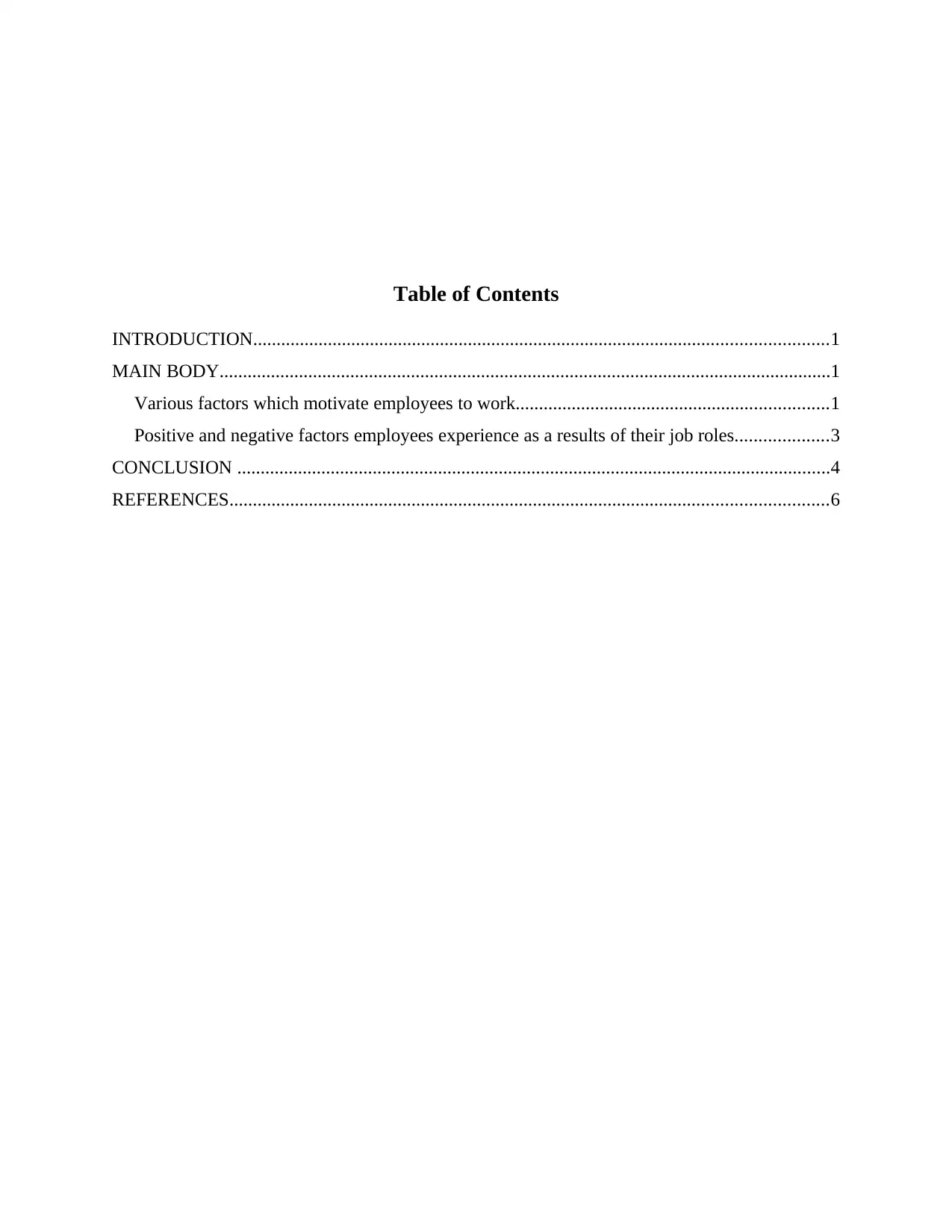
Table of Contents
INTRODUCTION...........................................................................................................................1
MAIN BODY...................................................................................................................................1
Various factors which motivate employees to work...................................................................1
Positive and negative factors employees experience as a results of their job roles....................3
CONCLUSION ...............................................................................................................................4
REFERENCES................................................................................................................................6
INTRODUCTION...........................................................................................................................1
MAIN BODY...................................................................................................................................1
Various factors which motivate employees to work...................................................................1
Positive and negative factors employees experience as a results of their job roles....................3
CONCLUSION ...............................................................................................................................4
REFERENCES................................................................................................................................6
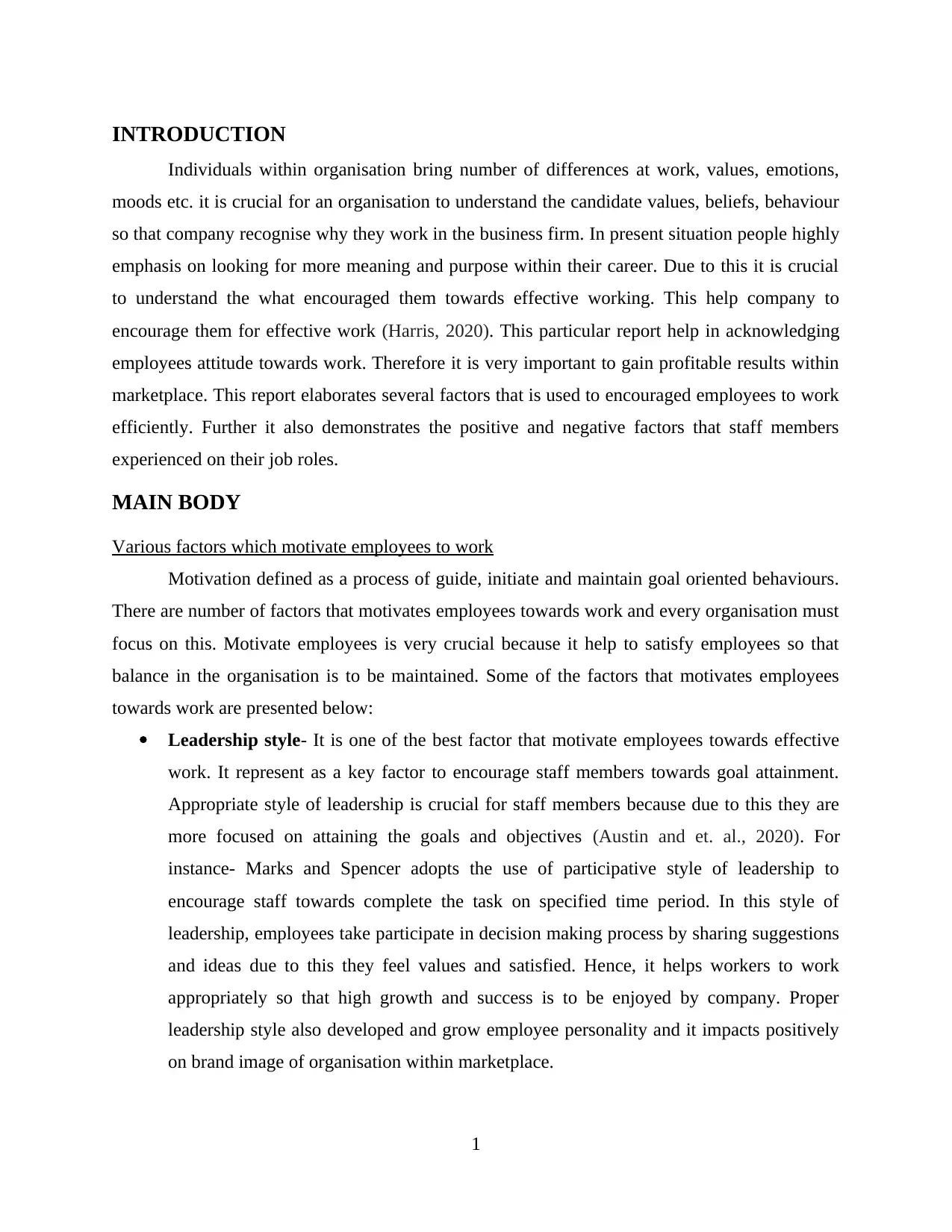
INTRODUCTION
Individuals within organisation bring number of differences at work, values, emotions,
moods etc. it is crucial for an organisation to understand the candidate values, beliefs, behaviour
so that company recognise why they work in the business firm. In present situation people highly
emphasis on looking for more meaning and purpose within their career. Due to this it is crucial
to understand the what encouraged them towards effective working. This help company to
encourage them for effective work (Harris, 2020). This particular report help in acknowledging
employees attitude towards work. Therefore it is very important to gain profitable results within
marketplace. This report elaborates several factors that is used to encouraged employees to work
efficiently. Further it also demonstrates the positive and negative factors that staff members
experienced on their job roles.
MAIN BODY
Various factors which motivate employees to work
Motivation defined as a process of guide, initiate and maintain goal oriented behaviours.
There are number of factors that motivates employees towards work and every organisation must
focus on this. Motivate employees is very crucial because it help to satisfy employees so that
balance in the organisation is to be maintained. Some of the factors that motivates employees
towards work are presented below:
Leadership style- It is one of the best factor that motivate employees towards effective
work. It represent as a key factor to encourage staff members towards goal attainment.
Appropriate style of leadership is crucial for staff members because due to this they are
more focused on attaining the goals and objectives (Austin and et. al., 2020). For
instance- Marks and Spencer adopts the use of participative style of leadership to
encourage staff towards complete the task on specified time period. In this style of
leadership, employees take participate in decision making process by sharing suggestions
and ideas due to this they feel values and satisfied. Hence, it helps workers to work
appropriately so that high growth and success is to be enjoyed by company. Proper
leadership style also developed and grow employee personality and it impacts positively
on brand image of organisation within marketplace.
1
Individuals within organisation bring number of differences at work, values, emotions,
moods etc. it is crucial for an organisation to understand the candidate values, beliefs, behaviour
so that company recognise why they work in the business firm. In present situation people highly
emphasis on looking for more meaning and purpose within their career. Due to this it is crucial
to understand the what encouraged them towards effective working. This help company to
encourage them for effective work (Harris, 2020). This particular report help in acknowledging
employees attitude towards work. Therefore it is very important to gain profitable results within
marketplace. This report elaborates several factors that is used to encouraged employees to work
efficiently. Further it also demonstrates the positive and negative factors that staff members
experienced on their job roles.
MAIN BODY
Various factors which motivate employees to work
Motivation defined as a process of guide, initiate and maintain goal oriented behaviours.
There are number of factors that motivates employees towards work and every organisation must
focus on this. Motivate employees is very crucial because it help to satisfy employees so that
balance in the organisation is to be maintained. Some of the factors that motivates employees
towards work are presented below:
Leadership style- It is one of the best factor that motivate employees towards effective
work. It represent as a key factor to encourage staff members towards goal attainment.
Appropriate style of leadership is crucial for staff members because due to this they are
more focused on attaining the goals and objectives (Austin and et. al., 2020). For
instance- Marks and Spencer adopts the use of participative style of leadership to
encourage staff towards complete the task on specified time period. In this style of
leadership, employees take participate in decision making process by sharing suggestions
and ideas due to this they feel values and satisfied. Hence, it helps workers to work
appropriately so that high growth and success is to be enjoyed by company. Proper
leadership style also developed and grow employee personality and it impacts positively
on brand image of organisation within marketplace.
1
⊘ This is a preview!⊘
Do you want full access?
Subscribe today to unlock all pages.

Trusted by 1+ million students worldwide
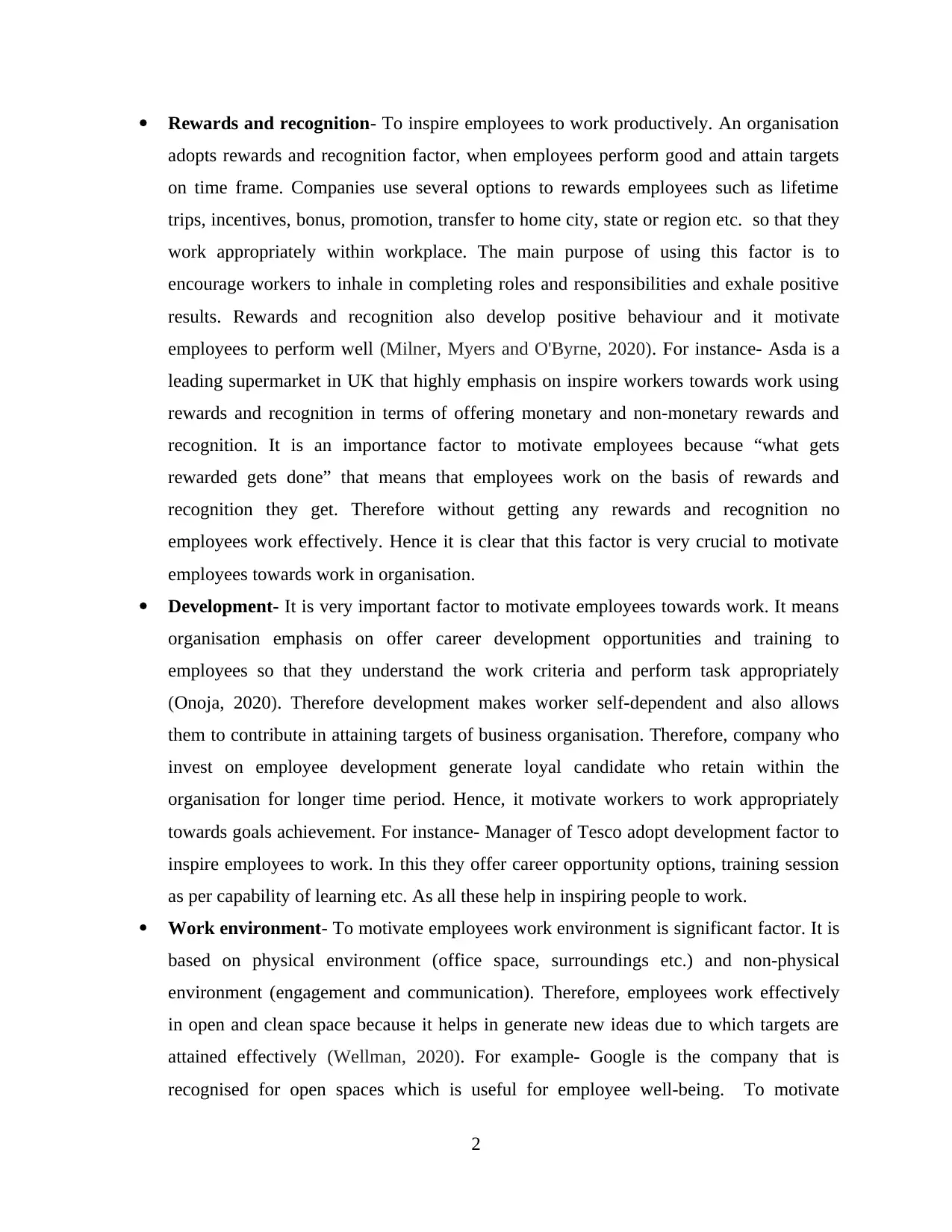
Rewards and recognition- To inspire employees to work productively. An organisation
adopts rewards and recognition factor, when employees perform good and attain targets
on time frame. Companies use several options to rewards employees such as lifetime
trips, incentives, bonus, promotion, transfer to home city, state or region etc. so that they
work appropriately within workplace. The main purpose of using this factor is to
encourage workers to inhale in completing roles and responsibilities and exhale positive
results. Rewards and recognition also develop positive behaviour and it motivate
employees to perform well (Milner, Myers and O'Byrne, 2020). For instance- Asda is a
leading supermarket in UK that highly emphasis on inspire workers towards work using
rewards and recognition in terms of offering monetary and non-monetary rewards and
recognition. It is an importance factor to motivate employees because “what gets
rewarded gets done” that means that employees work on the basis of rewards and
recognition they get. Therefore without getting any rewards and recognition no
employees work effectively. Hence it is clear that this factor is very crucial to motivate
employees towards work in organisation.
Development- It is very important factor to motivate employees towards work. It means
organisation emphasis on offer career development opportunities and training to
employees so that they understand the work criteria and perform task appropriately
(Onoja, 2020). Therefore development makes worker self-dependent and also allows
them to contribute in attaining targets of business organisation. Therefore, company who
invest on employee development generate loyal candidate who retain within the
organisation for longer time period. Hence, it motivate workers to work appropriately
towards goals achievement. For instance- Manager of Tesco adopt development factor to
inspire employees to work. In this they offer career opportunity options, training session
as per capability of learning etc. As all these help in inspiring people to work.
Work environment- To motivate employees work environment is significant factor. It is
based on physical environment (office space, surroundings etc.) and non-physical
environment (engagement and communication). Therefore, employees work effectively
in open and clean space because it helps in generate new ideas due to which targets are
attained effectively (Wellman, 2020). For example- Google is the company that is
recognised for open spaces which is useful for employee well-being. To motivate
2
adopts rewards and recognition factor, when employees perform good and attain targets
on time frame. Companies use several options to rewards employees such as lifetime
trips, incentives, bonus, promotion, transfer to home city, state or region etc. so that they
work appropriately within workplace. The main purpose of using this factor is to
encourage workers to inhale in completing roles and responsibilities and exhale positive
results. Rewards and recognition also develop positive behaviour and it motivate
employees to perform well (Milner, Myers and O'Byrne, 2020). For instance- Asda is a
leading supermarket in UK that highly emphasis on inspire workers towards work using
rewards and recognition in terms of offering monetary and non-monetary rewards and
recognition. It is an importance factor to motivate employees because “what gets
rewarded gets done” that means that employees work on the basis of rewards and
recognition they get. Therefore without getting any rewards and recognition no
employees work effectively. Hence it is clear that this factor is very crucial to motivate
employees towards work in organisation.
Development- It is very important factor to motivate employees towards work. It means
organisation emphasis on offer career development opportunities and training to
employees so that they understand the work criteria and perform task appropriately
(Onoja, 2020). Therefore development makes worker self-dependent and also allows
them to contribute in attaining targets of business organisation. Therefore, company who
invest on employee development generate loyal candidate who retain within the
organisation for longer time period. Hence, it motivate workers to work appropriately
towards goals achievement. For instance- Manager of Tesco adopt development factor to
inspire employees to work. In this they offer career opportunity options, training session
as per capability of learning etc. As all these help in inspiring people to work.
Work environment- To motivate employees work environment is significant factor. It is
based on physical environment (office space, surroundings etc.) and non-physical
environment (engagement and communication). Therefore, employees work effectively
in open and clean space because it helps in generate new ideas due to which targets are
attained effectively (Wellman, 2020). For example- Google is the company that is
recognised for open spaces which is useful for employee well-being. To motivate
2
Paraphrase This Document
Need a fresh take? Get an instant paraphrase of this document with our AI Paraphraser
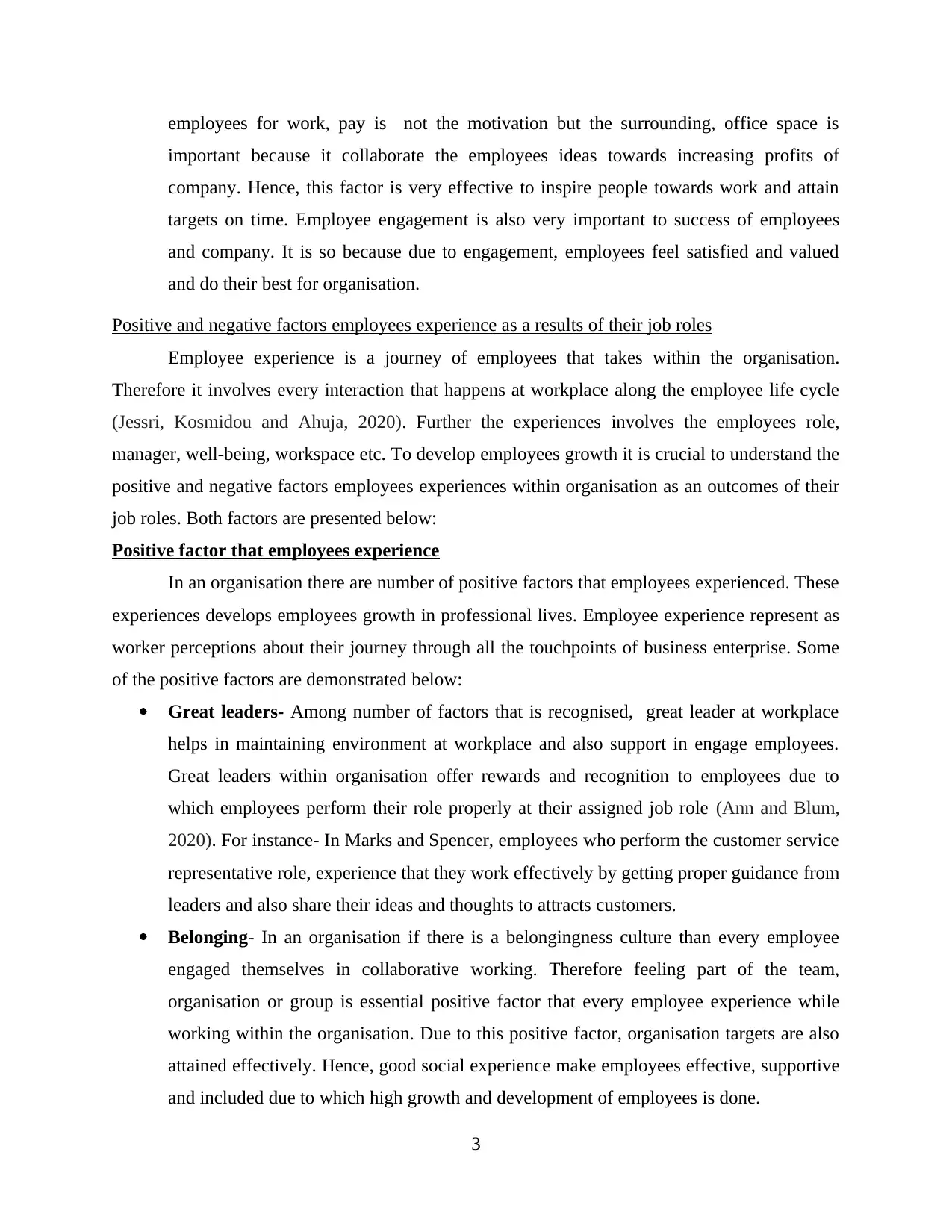
employees for work, pay is not the motivation but the surrounding, office space is
important because it collaborate the employees ideas towards increasing profits of
company. Hence, this factor is very effective to inspire people towards work and attain
targets on time. Employee engagement is also very important to success of employees
and company. It is so because due to engagement, employees feel satisfied and valued
and do their best for organisation.
Positive and negative factors employees experience as a results of their job roles
Employee experience is a journey of employees that takes within the organisation.
Therefore it involves every interaction that happens at workplace along the employee life cycle
(Jessri, Kosmidou and Ahuja, 2020). Further the experiences involves the employees role,
manager, well-being, workspace etc. To develop employees growth it is crucial to understand the
positive and negative factors employees experiences within organisation as an outcomes of their
job roles. Both factors are presented below:
Positive factor that employees experience
In an organisation there are number of positive factors that employees experienced. These
experiences develops employees growth in professional lives. Employee experience represent as
worker perceptions about their journey through all the touchpoints of business enterprise. Some
of the positive factors are demonstrated below:
Great leaders- Among number of factors that is recognised, great leader at workplace
helps in maintaining environment at workplace and also support in engage employees.
Great leaders within organisation offer rewards and recognition to employees due to
which employees perform their role properly at their assigned job role (Ann and Blum,
2020). For instance- In Marks and Spencer, employees who perform the customer service
representative role, experience that they work effectively by getting proper guidance from
leaders and also share their ideas and thoughts to attracts customers.
Belonging- In an organisation if there is a belongingness culture than every employee
engaged themselves in collaborative working. Therefore feeling part of the team,
organisation or group is essential positive factor that every employee experience while
working within the organisation. Due to this positive factor, organisation targets are also
attained effectively. Hence, good social experience make employees effective, supportive
and included due to which high growth and development of employees is done.
3
important because it collaborate the employees ideas towards increasing profits of
company. Hence, this factor is very effective to inspire people towards work and attain
targets on time. Employee engagement is also very important to success of employees
and company. It is so because due to engagement, employees feel satisfied and valued
and do their best for organisation.
Positive and negative factors employees experience as a results of their job roles
Employee experience is a journey of employees that takes within the organisation.
Therefore it involves every interaction that happens at workplace along the employee life cycle
(Jessri, Kosmidou and Ahuja, 2020). Further the experiences involves the employees role,
manager, well-being, workspace etc. To develop employees growth it is crucial to understand the
positive and negative factors employees experiences within organisation as an outcomes of their
job roles. Both factors are presented below:
Positive factor that employees experience
In an organisation there are number of positive factors that employees experienced. These
experiences develops employees growth in professional lives. Employee experience represent as
worker perceptions about their journey through all the touchpoints of business enterprise. Some
of the positive factors are demonstrated below:
Great leaders- Among number of factors that is recognised, great leader at workplace
helps in maintaining environment at workplace and also support in engage employees.
Great leaders within organisation offer rewards and recognition to employees due to
which employees perform their role properly at their assigned job role (Ann and Blum,
2020). For instance- In Marks and Spencer, employees who perform the customer service
representative role, experience that they work effectively by getting proper guidance from
leaders and also share their ideas and thoughts to attracts customers.
Belonging- In an organisation if there is a belongingness culture than every employee
engaged themselves in collaborative working. Therefore feeling part of the team,
organisation or group is essential positive factor that every employee experience while
working within the organisation. Due to this positive factor, organisation targets are also
attained effectively. Hence, good social experience make employees effective, supportive
and included due to which high growth and development of employees is done.
3
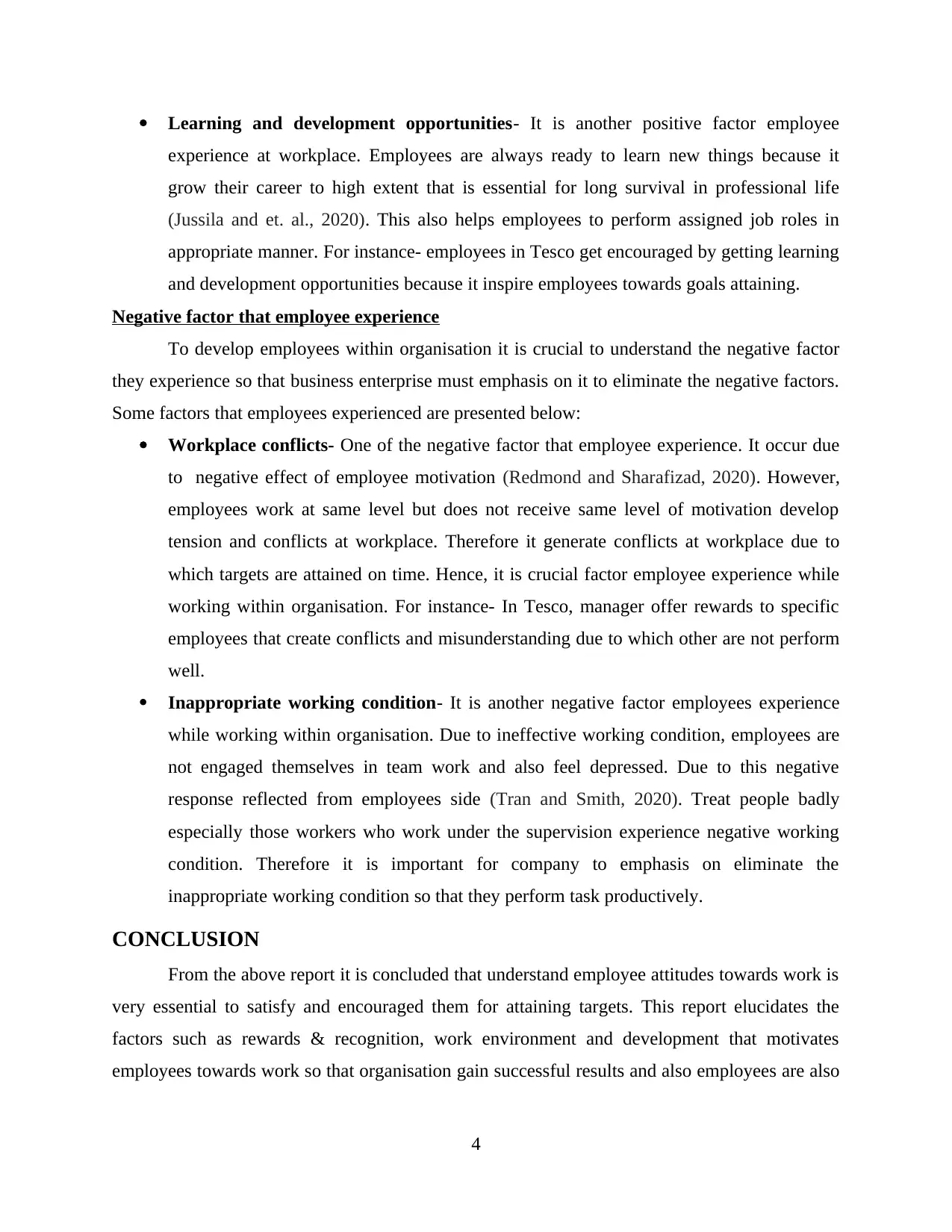
Learning and development opportunities- It is another positive factor employee
experience at workplace. Employees are always ready to learn new things because it
grow their career to high extent that is essential for long survival in professional life
(Jussila and et. al., 2020). This also helps employees to perform assigned job roles in
appropriate manner. For instance- employees in Tesco get encouraged by getting learning
and development opportunities because it inspire employees towards goals attaining.
Negative factor that employee experience
To develop employees within organisation it is crucial to understand the negative factor
they experience so that business enterprise must emphasis on it to eliminate the negative factors.
Some factors that employees experienced are presented below:
Workplace conflicts- One of the negative factor that employee experience. It occur due
to negative effect of employee motivation (Redmond and Sharafizad, 2020). However,
employees work at same level but does not receive same level of motivation develop
tension and conflicts at workplace. Therefore it generate conflicts at workplace due to
which targets are attained on time. Hence, it is crucial factor employee experience while
working within organisation. For instance- In Tesco, manager offer rewards to specific
employees that create conflicts and misunderstanding due to which other are not perform
well.
Inappropriate working condition- It is another negative factor employees experience
while working within organisation. Due to ineffective working condition, employees are
not engaged themselves in team work and also feel depressed. Due to this negative
response reflected from employees side (Tran and Smith, 2020). Treat people badly
especially those workers who work under the supervision experience negative working
condition. Therefore it is important for company to emphasis on eliminate the
inappropriate working condition so that they perform task productively.
CONCLUSION
From the above report it is concluded that understand employee attitudes towards work is
very essential to satisfy and encouraged them for attaining targets. This report elucidates the
factors such as rewards & recognition, work environment and development that motivates
employees towards work so that organisation gain successful results and also employees are also
4
experience at workplace. Employees are always ready to learn new things because it
grow their career to high extent that is essential for long survival in professional life
(Jussila and et. al., 2020). This also helps employees to perform assigned job roles in
appropriate manner. For instance- employees in Tesco get encouraged by getting learning
and development opportunities because it inspire employees towards goals attaining.
Negative factor that employee experience
To develop employees within organisation it is crucial to understand the negative factor
they experience so that business enterprise must emphasis on it to eliminate the negative factors.
Some factors that employees experienced are presented below:
Workplace conflicts- One of the negative factor that employee experience. It occur due
to negative effect of employee motivation (Redmond and Sharafizad, 2020). However,
employees work at same level but does not receive same level of motivation develop
tension and conflicts at workplace. Therefore it generate conflicts at workplace due to
which targets are attained on time. Hence, it is crucial factor employee experience while
working within organisation. For instance- In Tesco, manager offer rewards to specific
employees that create conflicts and misunderstanding due to which other are not perform
well.
Inappropriate working condition- It is another negative factor employees experience
while working within organisation. Due to ineffective working condition, employees are
not engaged themselves in team work and also feel depressed. Due to this negative
response reflected from employees side (Tran and Smith, 2020). Treat people badly
especially those workers who work under the supervision experience negative working
condition. Therefore it is important for company to emphasis on eliminate the
inappropriate working condition so that they perform task productively.
CONCLUSION
From the above report it is concluded that understand employee attitudes towards work is
very essential to satisfy and encouraged them for attaining targets. This report elucidates the
factors such as rewards & recognition, work environment and development that motivates
employees towards work so that organisation gain successful results and also employees are also
4
⊘ This is a preview!⊘
Do you want full access?
Subscribe today to unlock all pages.

Trusted by 1+ million students worldwide

developed. Further this report help to understand positive and negative factors that employees
experience while perform their job roles.
5
experience while perform their job roles.
5
Paraphrase This Document
Need a fresh take? Get an instant paraphrase of this document with our AI Paraphraser
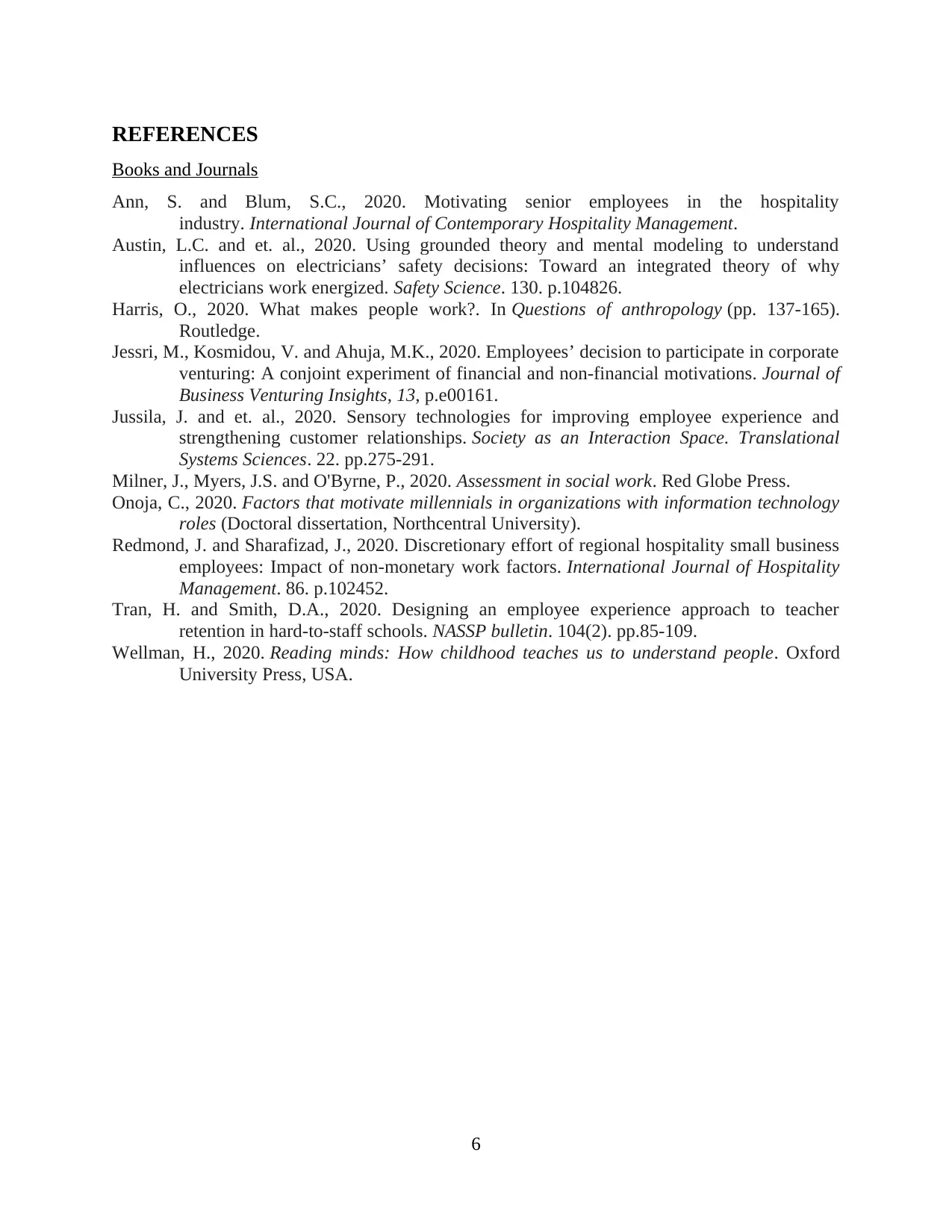
REFERENCES
Books and Journals
Ann, S. and Blum, S.C., 2020. Motivating senior employees in the hospitality
industry. International Journal of Contemporary Hospitality Management.
Austin, L.C. and et. al., 2020. Using grounded theory and mental modeling to understand
influences on electricians’ safety decisions: Toward an integrated theory of why
electricians work energized. Safety Science. 130. p.104826.
Harris, O., 2020. What makes people work?. In Questions of anthropology (pp. 137-165).
Routledge.
Jessri, M., Kosmidou, V. and Ahuja, M.K., 2020. Employees’ decision to participate in corporate
venturing: A conjoint experiment of financial and non-financial motivations. Journal of
Business Venturing Insights, 13, p.e00161.
Jussila, J. and et. al., 2020. Sensory technologies for improving employee experience and
strengthening customer relationships. Society as an Interaction Space. Translational
Systems Sciences. 22. pp.275-291.
Milner, J., Myers, J.S. and O'Byrne, P., 2020. Assessment in social work. Red Globe Press.
Onoja, C., 2020. Factors that motivate millennials in organizations with information technology
roles (Doctoral dissertation, Northcentral University).
Redmond, J. and Sharafizad, J., 2020. Discretionary effort of regional hospitality small business
employees: Impact of non-monetary work factors. International Journal of Hospitality
Management. 86. p.102452.
Tran, H. and Smith, D.A., 2020. Designing an employee experience approach to teacher
retention in hard-to-staff schools. NASSP bulletin. 104(2). pp.85-109.
Wellman, H., 2020. Reading minds: How childhood teaches us to understand people. Oxford
University Press, USA.
6
Books and Journals
Ann, S. and Blum, S.C., 2020. Motivating senior employees in the hospitality
industry. International Journal of Contemporary Hospitality Management.
Austin, L.C. and et. al., 2020. Using grounded theory and mental modeling to understand
influences on electricians’ safety decisions: Toward an integrated theory of why
electricians work energized. Safety Science. 130. p.104826.
Harris, O., 2020. What makes people work?. In Questions of anthropology (pp. 137-165).
Routledge.
Jessri, M., Kosmidou, V. and Ahuja, M.K., 2020. Employees’ decision to participate in corporate
venturing: A conjoint experiment of financial and non-financial motivations. Journal of
Business Venturing Insights, 13, p.e00161.
Jussila, J. and et. al., 2020. Sensory technologies for improving employee experience and
strengthening customer relationships. Society as an Interaction Space. Translational
Systems Sciences. 22. pp.275-291.
Milner, J., Myers, J.S. and O'Byrne, P., 2020. Assessment in social work. Red Globe Press.
Onoja, C., 2020. Factors that motivate millennials in organizations with information technology
roles (Doctoral dissertation, Northcentral University).
Redmond, J. and Sharafizad, J., 2020. Discretionary effort of regional hospitality small business
employees: Impact of non-monetary work factors. International Journal of Hospitality
Management. 86. p.102452.
Tran, H. and Smith, D.A., 2020. Designing an employee experience approach to teacher
retention in hard-to-staff schools. NASSP bulletin. 104(2). pp.85-109.
Wellman, H., 2020. Reading minds: How childhood teaches us to understand people. Oxford
University Press, USA.
6
1 out of 8
Related Documents
Your All-in-One AI-Powered Toolkit for Academic Success.
+13062052269
info@desklib.com
Available 24*7 on WhatsApp / Email
![[object Object]](/_next/static/media/star-bottom.7253800d.svg)
Unlock your academic potential
Copyright © 2020–2026 A2Z Services. All Rights Reserved. Developed and managed by ZUCOL.




